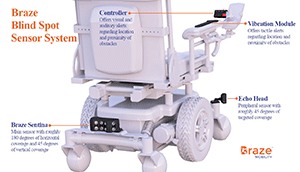Braze Mobility takes ‘next step’ with VA

By Liz Beaulieu, Editor
Updated 9:15 AM CST, Tue November 23, 2021
 TORONTO – Braze Mobility had the opportunity to get important feedback on its terrain analysis system as part of the recent Breaking Boundaries: Collaboration Challenge, hosted by the Veterans Health Administration Ecosystem and Founder Institute, says CEO Pooja Viswanathan.
TORONTO – Braze Mobility had the opportunity to get important feedback on its terrain analysis system as part of the recent Breaking Boundaries: Collaboration Challenge, hosted by the Veterans Health Administration Ecosystem and Founder Institute, says CEO Pooja Viswanathan.
The system will help wheelchair users navigate outdoor environments more safely and independently, using proprietary machine-learning algorithms that identify hazards.
“It’s a co-creation process, so there’ll be various phases of development that we’ll collaborate with them on,” said Viswanathan, who was a featured speaker at the VHA Innovation Experience Oct. 27-28, and who has completed doctoral and post-doc research in robotics and assistive technologies. “There will be early testing of the product and feedback, and then incorporating that feedback into future development.”
About 100 companies applied to the challenge, 19 made pitches to Veterans Health Administration Innovators Network (iNET) sites and 10 were selected in September.
From those 10, the iNET sites chose companies they wanted to work with, and seven sites, including lead site VA Palo Alto Health Care System, chose Braze Mobility, Viswanathan says.
“We were one of the companies that had the most sites that wanted to collaborate with us,” she said. “It shows how interested people are in mobility. I’m always skeptical that it’s not top of mind, so it was great to see.”
The terrain analysis system is Braze Mobility’s attempt to take its blind spot sensors, which can be added to any wheelchair and which count the VA as a customer, “to the next step,” Viswanathan says.
“Our sensors have been helping users navigate spaces that, otherwise, they’ve struggled with,” she said. “The feedback we’ve gotten is that they’re saving users a lot in property damage. But we wanted to take that to the next step and look at other challenges that users are having indoors – and outdoors. We’re taking a more detailed look at the environments they’re navigating.”
While a number of technologies are hitting the market to make wheelchairs “smarter,” Braze Mobility’s mission will be to keep the user in the driver’s seat, Viswanathan says.
“We’re looking at the problem more holistically,” she said. “What are the more challenging hazards – not just curbs – and what’s the right way to inform the user of them? Our strategy is not to take over control, but to continue to support the user and enhance their awareness.”
Comments